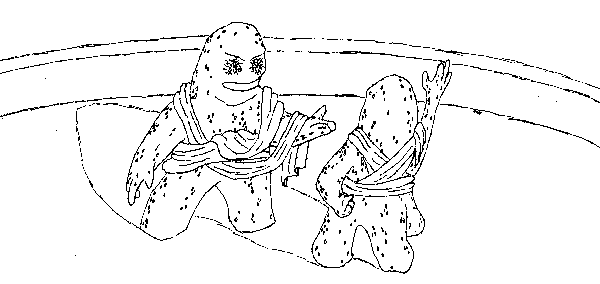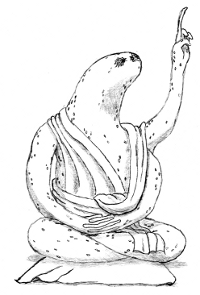|
Author’s Note: A lot of collaboration went into the development of dralasite society in the project forums at www.starfrontiers.us/node/2945 . This article would not have been possible without that collaborative process and I am deeply grateful to the host of people too numerous to mention here who have contributed. |
Dralasites, of all the inhabitants of the Frontier, seem to be hard wired for philosophy. Their society has evolved in such a way to ensure the primacy of philosophical inquiry and it is self-reinforcing in that respect. To understand dralasite philosophy one must understand their society.
Dralasite society has a conception of the family similar to humanity – parents guiding the young – but it’s much looser than the human concept. The true foundation of their society is the social school, called the stoa. Social schools are groupings of dralasites that share common opinions, beliefs, interests, or humor. The Circle of Debate is the central activity of the social school. A dral parent has a strong influence in a young dral's initial choice of social school. Typically the parent first presents its young bud to the school it currently favors.
Life experience and formal education tend to alter a dralasite’s choice of school. It would be rare for a dralasite to have not been a member in dozens of social schools over the course of its life. Membership is granted by common consent and rarely revoked. These schools typically number about a couple dozen individuals in active membership. Elder dralasites tend to be the de facto leaders of these schools and when a leader dies it is not an uncommon occurrence for a group to divide into smaller groups.
Like human parents the social school takes responsibility for the young and elderly. In the school is where a dralasite will celebrate life events such as their budding memory, reception of community speaking rights (gaining one's voice), and death. A dral in need may turn to its companions in all the schools of which it is a member for help. Typically, it can only expect a little help here and there from any given school, thus the value of many school memberships.
A young dralasite will wander briefly after budding enjoying their new found freedom and are then naturally drawn back to their parent seeking guidance and parenting. This is the time that a dralasite is introduced to the parent's school for membership.
Education is pursued separate from the social school in large rounds with professional teachers. A few years after budding, a dral’s formal education begins. Young dralasites advance through progressively formal rounds for about ten years until they have been deemed by their teachers to be educated enough to keep up with society. Specialized training, if any, is undertaken after one's rounds. Dralasites are fond of traveling far, even off world if they can work up the means, to pursue their specialized training.
It is no wonder that with a whole society focused on standing in the debate circle that dralasites are philosophical. The very structure of the social school guarantees that each successive generation will have developed a personal philosophy and defend it in debate for hours.
The foundation of dralasite philosophy is the Dralasitic Creed. It enshrines a basic belief that all beings should have their own beliefs and defend them:
The Dralasite Creed
- I believe in truth and will continually test to refine the quality of my understanding.
- I believe in the quality of my ideas and can defend them in the circle of debate.
- I believe in the crucible of debate where the community can recognize the quality of my truth.
Of all things believed by dralasites, this is the philosophy that is universal to the species.
The Five Appendages is not so much a creed or statement of belief but almost a set of “sacraments” considered necessary to the being-hood of the dralasite. It is not required that a dralasite fulfill all of the five appendages but most do.
The Five Appendages
- The Creed (affirmed before the community and in the Circle of Debate).
- The Gaining of Voice (acceptance by the community to speak in the Circle of Debate).
- The Stand (done in the Great Circle of Debate against all comers, though it is not necessary to emerge with one's philosophy unchanged).
- The Budding (an important rite of passage necessary for the preservation of the species - all dralasites are expected to do their part)
- The Circle’s End (sometimes a poetic reference to death but in the Five Appendages it carries the idea of service to the community in the twilight of one’s life).
While the stoa hosts the Circle of Debate, the Great Circle of Debate is a gathering of several related social schools. They are not related in any organic sense but related by topic or interest and often from differing sides of that interest. A dral that makes the stand in the Great Circle of Debate attains a special status. It is not expected that the dral making this stand will emerge with his philosophy and belief unchanged. The most highly esteemed emerge with slight refinements taken from their opponents while the core of their philosophy remains essentially unchanged.
The first three Appendages deal with the dral finding his place in the community but the last two are seen as his confirming his place in the community. The act of budding is a tangible reminder of a dralasite’s existence. Circle’s End is less tangible in what it gives back but is considered the highest calling of any elder dralasite.
The most widely read of all dralasite philosophy is the Conversations with the Mols. It’s a written record (some say fictionalized) between an apprentice and a professional teacher. In the conversations the full scope of dralasite humor begins to emerge in the relaxed style of the conversations. The following is some excerpts from the Conversations with the Mols.
Conversations of Mol Geddon
Conversation 12
Apprentice: “Mol, what is truth?”
Mol Geddon: “Truth is Truth.”
Apprentice: “Yes Mol, but what distinguishes it from a lie.”
Mol Geddon: “Being Truth.”
Apprentice: “Yes Mol, but how can truth be recognized from lie?”
Mol Geddon: “There is Inner Truth and Outer Truth. When Inner Truth is strong it recognizes Outer Truth.”
Apprentice: “Inner truth? Outer truth?
Mol Geddon: “When the Truth that is in your protoplasm is strong you can recognize the Truth around you and thus distinguish it from lie. When lies are strong within your protoplasm you will deceive even yourself confusing lie for Truth and your truth becomes lie.”
Apprentice: “Yes Mol, but how may I become truth?”
Mol Geddon: “One must strive to live truthfully. As food is taken into the body to fuel continued life so truth must be lived to fuel the Truth within. Listen well to this mystery; if you act truthful then you will be truthful. To act truth is to be truth.”
Converstation 13
Apprentice: “Mol does truth ever change?”
Mol Geddon: “Yes.”
Apprentice: “If it changes, then how can it be absolute?”
Mol Geddon: “Truth is Truth. It flows from finite to absolute, from temporal to infinite. Truth is Truth regardless of its constituent values. When all values reach infinite then Truth is absolute. We move in time and space, space has three values…”
Apprentice: “Three dimensions?”
Mol Geddon nodded slightly: “and time has a value. We perceive Truth from the perspective of time and space, a perspective that has 4 values. When all values reach infinite then Truth is of absolute value.”
Apprentice: “Mol, I… I… but how can truth change and still be truth?”
Mol Geddon chuckled: “That is a different question.”
Conversation 25
Mol Woosh: “Humor is at once irreverent, joyous, mean, spiteful, honest, happy, hurtful, and one hundred other things.”
Apprentice: “Mol, how can humor be all those things?”
Mol Woosh: “It is all those things because it comes from within a being. It is a window to the inner nucleus and is a reflection of the Inner Truth of a being. Some beings laugh out of nervousness that the Truth expressed in the joke may be the Truth deep within them. Some laugh out of mirth recognizing the Truth of the joke as the Truth within them. Some refuse to laugh lest they reveal any Truth and yet even that can be a window to their nucleus.”
Apprentice: “You refer to yazirians?”
Mol Woosh: “One should remember that when one pulls a yazirian’s leg do not pull his mane also.”
A yazirian priest happened by and said: “If you don’t get the joke it’s probably about you.”
Whereupon, Mol Woosh laughed uproariously while the yazirian scowled.



